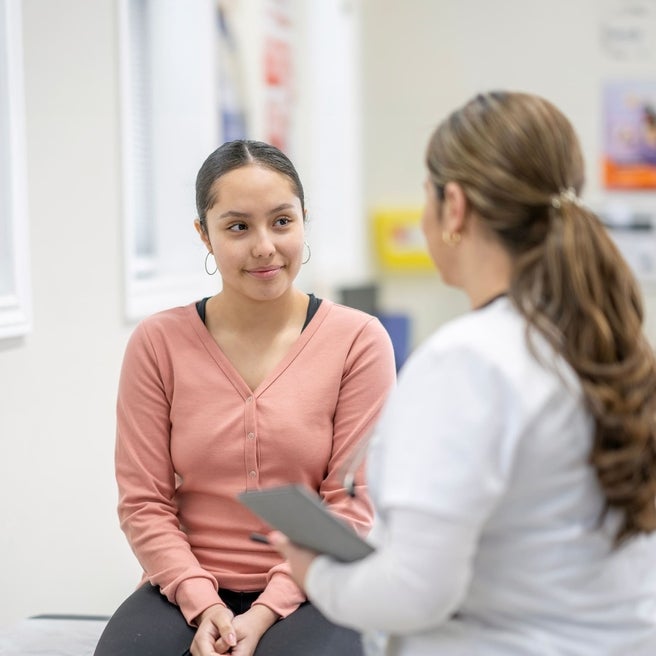What is heavy menstrual bleeding?
Heavy menstrual bleeding, also known as menorrhagia, is a menstrual condition characterized by heavy or prolonged menstrual periods. Heavy bleeding is a common concern for adolescents still learning what a “normal” menstrual cycle is for them. However, most adolescents do not experience blood loss severe enough to be considered heavy menstrual bleeding. It is not uncommon for an adolescent to experience heavy menstrual bleeding if they have irregular periods.
Heavy menstrual bleeding can interfere with an adolescent’s normal activities and cause anemia. If your teen has abnormally heavy periods that are causing pain or substantially affecting daily activities, your teen should be examined by a specialist in adolescent medicine or gynecology.
Heavy menstrual bleeding may be a temporary or lifelong condition. Fortunately, there are many effective treatments for the condition.
Causes of heavy menstrual bleeding
The cause of heavy menstrual bleeding in adolescents cannot always be determined, but several factors have been linked to the condition.
Hormonal imbalance
Hormone imbalances between estrogen and progesterone can cause heavy menstrual bleeding. The three most common in adolescents are:
- Dysfunction of the ovaries — when a teen’s body doesn’t ovulate (release an egg) during the menstrual cycle, this creates a hormone imbalance and can cause heavy menstrual bleeding.
- Polycystic ovarian syndrome
- Obesity
- Thyroid issues such as hypothyroidism
Bleeding disorders
- Von Willebrand disease
- Platelet disorders, such as low platelets or poorly functioning platelets
Infections
- Sexually transmitted infections
- Pelvic infections
Structural problems
Problems with the sexual organs themselves can cause heavy menstrual bleeding. These may include:
- Polyps — small, benign (non-cancerous) growths that form on the lining of the uterus can cause heavy or prolonged menstruation.
- Uterine fibroids — benign tumors that form in the uterus can also cause prolonged or heavy menstrual bleeding.
- Cancer (very rare in teens) — malignant (cancerous) growths in the uterus or cervix can cause heavy or prolonged bleeding.
Medications
Medications that can contribute to heavy and prolonged menstrual bleeding include: hormone medications, anti-inflammatories and anticoagulants.
Pregnancy complications
Even during pregnancy, heavy menstrual bleeding can sometimes occur. Females who experience a single, late menstrual period that is exceptionally heavy may have experienced a miscarriage. These patients are managed at an adult facility.
Signs and symptoms of heavy menstrual bleeding
Symptoms of heavy menstrual bleeding may include:
- Soaking through one or more sanitary pads or tampons every hour for several consecutive hours
- Needing to wake up to change sanitary protection during the night
- Needing to use double sanitary protection to control the menstrual flow
- Menstrual bleeding that lasts longer than a week
- Symptoms of anemia, like fatigue, light-headedness and shortness of breath
- Passing blood clots larger than a quarter
- Restricting activities because of heavy menstrual flow
Diagnosis and testing
At Children’s Hospital of Philadelphia (CHOP), we welcome parents and caregivers as key partners in supporting a young person’s care during and after treatment for menorrhagia.
The diagnosis of heavy menstrual bleeding begins with a series of questions about the patient’s overall medical history, medications, menstruation cycle, sexual activity and any pregnancies.
Clinicians may ask the teen to track their bleeding and nonbleeding days, how heavy the menstrual flow was during each day, and how many pads or tampons were used.
To help young people develop the skills needed to be responsible for their own health, clinicians typically ask to spend time alone with patients during each visit. This helps young people become comfortable talking with their healthcare providers about their concerns and allows patients to ask questions that may be more difficult to say in front of their parents and caregivers. We respect the privacy and confidentiality of our young patients, while ensuring that young people are safe and connected to the appropriate services and resources they need.
A physical examination will follow the interview, along with a pelvic examination if appropriate. Additional tests may be performed to rule out other potential causes for the teen’s heavy menstruation.
Tests may include:
- Blood tests
- Ultrasound
Treatment of heavy menstrual bleeding
At Children’s Hospital of Philadelphia, adolescent medicine specialists are able to manage the majority of cases of heavy menstrual bleeding. However, if necessary, a coordinated approach may be used with specialists from gynecology, hematology, radiology and endocrinology and others to accurately diagnose and treat patients with heavy menstrual bleeding.
Treatment for heavy menstrual bleeding will be recommended by your adolescent's physician based on:
- Your adolescent's age, overall health and medical history
- Cause and severity of the condition
- Your adolescent's tolerance for specific medications, procedures or therapies
- Your adolescent’s future childbearing plans
- Effects of the condition on your adolescent’s lifestyle
- Your adolescent's opinion or preference
Nonsurgical treatment
In most cases, heavy menstrual bleeding can be treated with medication such as:
- Nonsteroidal anti-inflammatory drugs (i.e. ibuprofen) that reduce blood loss and relieve painful menstrual cramps (dysmenorrhea)
- Oral contraceptives to better regulate the menstrual cycle and reduce prolonged or excessive menstrual bleeding
- Oral progesterone to balance hormone levels and reduce heavy bleeding.
- Hormonal intrauterine devices (IUD), which release a type of progestin, to decrease menstrual bleeding and cramping
- Tranexamic acid, taken only during menstrual bleeding, can reduce blood loss
Surgical treatment
In rare cases, if a surgical procedure is needed, the patient will be a referred to a gynecologist.
Resources to help
Adolescent Medicine Resources
We have created resources to help you find answers to your questions about health issues that become more relevant during your child's teen years.
